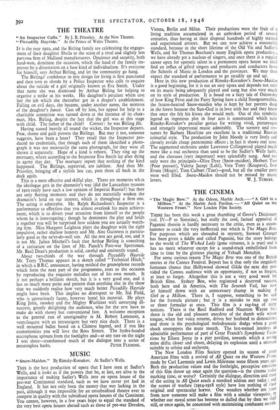THE THEATRE
" An Inspector Calls." By J. B. Priestley. At the New Theatre. " Piccadilly Hayride." At the Prince of Wales Theatre.
This is a most effective and skilful play. There are moments when the ideologue gets in the dramatist's way (did the Lancashire tycoons of 19to really have such a low opinion of Imperial Russia?) but they .are only fleeting moments and they do not materially weaken the dramatist's hold on our interest, which is throughout a firm one. The acting is admirable. Mr. Ralph Richardson's Inspector is a performance so effortless that you almost overlook his main achieve- ment, which is to divert your attention from himself to the people whom he is interrogating ; though he dominates the play and holds it together you will be surprised how seldom you are actually watch- ing him. Miss Margaret Leighton plays the daughter with the right impulsive, rather shallow honesty. and Mr. Alec Guinness is particu- larly good as the ne'er-do-well son. All the rest are good, too, and it is not Mr. Julien Mitchell's fault that Arthur Birling is something of a caricature on the lines of Mr. Punch's Post-war Sportsman. Mr. Basil Dean's production is solid, careful and eminently sound.
About two-thirds of the way through Piccadilly Hayride Mr. Terry Thomas appears in a sketch called " Technical Hitch," in which a B.B.C. announcer, having mislaid the gramophone records which form the next part of the programme, rises to the occasion by reproducing the requisite melodies out of his own mouth. It it not perhaps a brilliant sketch, but it is a very good one, and it has so much more point and pattern than anything else in the show that we suddenly realise how very much better Piccadilly Hayride might have been. This implies no disrespect to Mr. Sid Field, who is uproariously funny, however banal his material. He plays King John, snooker and the Mighty Wurlitzer with unvarying ill- success, greatly delighting the audience, who for the rest have to make do with showy but conventional fare. A welcome exception to the general run of unoriginality is M. Robert Lamouret, a ventriloquist with an intransigent but very nice duck. There is a well mounted ballet based on a Chinese legend, and if you like contortionists you will love the Ross Sisters. The hydra-headed microphone sprouts from the footlights and—at any rate on the night I was there—transformed much of the dialogue into a series of IT is the year 1910, and the Birling family are celebrating the engage- ment of their daughter Sheila to the scion of a rival and slightly less parvenu firm of Midland manufacturers. Opulence and security, both hard-won, dominate the occasion, which the head of the family im- proves by a dissertation on a base kind of individualism. It's everyone for himself, says Arthur Birling, and let the community go hang.
The Birlings' confidence in this design for living is first punctured and then torn to shreds by a Police Inspector who calls to enquire about the suicide of a girl originally known as Eva Smith. Under that name she was dismissed by Arthur Birling for helping to organise a strike in his works. His daughter's petulant whim cost her the job which she thereafter got in a draper's establishment. Falling on evil days, she became, under another name, the mistress
of the daughter's fiancé. Cast off by him, her appeal for help to a charitable committee was turned down at the instance of its chair- man, Mrs. Biding, despite the fact that the girl was at this stage with child. The father of the child? Correct : he was Birling fils.
Having scored heavily all round the wicket, the Inspector departs. Fear, shame and guilt possess the Birlings. But may it not, someone suggests, have been a hoax? They recall that the Inspector pro- duced no credentials, that though each of them identified a photo- graph it was not necessarily the same photograph, for they were all shown it separately. Hope of a kind is reborn. They ring up the mortuary, where according to the Inspector Eva Smith lay after dying in agony that day. The mortuary report that nothing of the kind happened. The Birlings, reprieved, are jubilant. And then Mr. Priestley, bringing off a stylish late cut, puts them all back in the dock again.






























 Previous page
Previous page